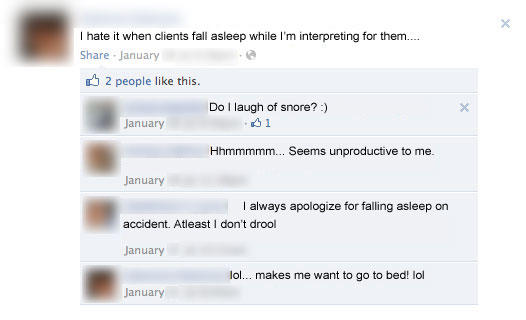
Social media and online behavior is a fact of life in the 21st Century. Wing Butler provides insight on the topic and challenges sign language interpreters to participate in the evolution of the RID Code of Professional Conduct.
The distance between our physical world and the virtual world of social media often invites behavior one would never project in real life. This virtual world introduces a whole new context of social norms and acceptable personal expression. Unfortunately, it appears in many cases that sign language interpreters appear to lack an awareness of the impact of social networking expression on their careers. What’s more, when you combine this lack of awareness with the view that the right to self-expression precedes all obligations, the result is an ethical distortion that undermines the sanctity of the relationship interpreters have with the D/deaf community.
The Ethical Distortion of Social Media
A large part of a sign language interpreter’s skillset is a keen situational awareness that is guided by ethical standards intended to protect consumers, the integrity of the profession, and allow the interpreting process to flow unobstructed.
This professional skillset blends with our personal image and influences how we conduct ourselves publically, even off the clock. Because we identify so strongly with the tangibility of our physical space, what we call “real life,” the consequences of our behavior and personal expression are easy to identify. As a result, we are more easily able to avoid potential conflict.
Unfortunately, the cognitive distance between our physical world and the virtual world combined with this lack of awareness of the impact of social networking expression creates an illusion that impairs a sign language interpreter’s situational awareness. This impairment leads to a distorted view and understanding of what is ethically acceptable online. Sadly, the result is a large number of interpreters who are unaware that some of their social networking activity is a breach of their professional ethics.
The 4 Symptoms of Distortion
Because online communication mirrors our real world experience, identifying the 4 primary symptoms of a social networking induced distortion offers clarity on potential ethical missteps.
The following content is being used to exemplify the symptoms of ethical distortion and to elicit our reaction to them within the framework of our ethical obligations as sign language interpreters.
Symptom 1: The interpreter prioritizes the right of online self-expression above ethical responsibilities.

Symptom 2: The interpreter believes their social media page is an intimate private space.

Symptom 3: The interpreter assumes that only close friends, familiar with their personal circumstances, view them online. Notwithstanding the regular practice of “Googling” someone to obtain a character reference.
 Symptom 4: The Interpreter views digital content as temporary. They fail to understand that digital content, particularly images, will remain forever.
Symptom 4: The Interpreter views digital content as temporary. They fail to understand that digital content, particularly images, will remain forever.
 When interpreters telegraph opposing political opinions, an emotional disposition, or intimate windows into their personal life, it may lead to reasons for incompatibility with the consumer, and thus the assignment. You may have noticed in the comment section of Brandon Arthur’s post, How do Sign Language Interpreters Increase Opportunity in a Weak Economy?, Lucky expresses concern about the social networking activities of sign language interpreters.
When interpreters telegraph opposing political opinions, an emotional disposition, or intimate windows into their personal life, it may lead to reasons for incompatibility with the consumer, and thus the assignment. You may have noticed in the comment section of Brandon Arthur’s post, How do Sign Language Interpreters Increase Opportunity in a Weak Economy?, Lucky expresses concern about the social networking activities of sign language interpreters.
This illusion induced ethical impairment is, and will be, responsible for an increasing amount of professional suicides among members of the sign language interpreting profession.
How Do We Intervene?
The premise of the Code of Professional Conduct (CPC) by the Registry of Interpreters for the Deaf (RID) was crafted to offer professional interpreters a behavioral compass of sorts. Clearly, the authors of this compass weren’t considering the impacts of social media when it was drafted. Having said that, in my view, any attempt to use the CPC as currently written to gauge the ethical boundaries of the intersection of social networking expression and sign language interpreter ethics will likely leave you scratching your head.
To answer the invite inconspicuously stated in the CPC, “This Code of Professional Conduct is a working document that is expected to change over time … [RID] members are encouraged to recommend changes for future updates.” Perhaps, we should consider adding an 8th tenet to the CPC to specifically address the ethical behavior displayed by sign language interpreters as a result of the proliferation of social media.
While this proposed addition to the CPC is not perfect, your feed is welcome and encouraged Note, the proposed tenet below is modeled after the American Medical Association’s Policy on social media.
Tenet 8: Interpreters Conduct Themselves Professionally Online
The Internet has created the ability for sign language interpreters and the sign language community to communicate and share information quickly and with millions of people easily. Participating in social networking and other similar Internet opportunities can support interpreter’s personal expression, enable individual interpreters to have a professional presence online, foster collegiality and camaraderie within the profession, provide opportunity to widely disseminate industry related information and community-centric messages and other valuable communication. Social networks, blogs, and other forms of communication online also pose new challenges to the relationship between interpreters and their consumers. Interpreters should weigh a number of considerations when maintaining a presence online:
8.1 Interpreters should be cognizant of the standards of consumer privacy and confidentiality that must be maintained in all environments, including online, and must refrain from posting identifiable assignment information online.
8.2 When using the Internet for social networking, interpreters should use privacy settings to safeguard personal information and content to the extent possible, but should realize that privacy settings are not absolute and that once on the Internet, content is likely there permanently. Thus, interpreters should routinely monitor their own Internet presence to ensure that their personal and professional information on their own sites and, to the extent possible, content posted about them by others, is accurate and appropriate.
8.3 If they interact with the D/deaf community on the Internet, interpreters must appropriately maintain the boundaries of the interpreter-consumer relationship in accordance with ethical guidelines within the CPC, just as they would in any other context.
8.4 To maintain appropriate professional boundaries interpreters should consider separating personal and professional content online.
8.5 When interpreters see content posted by colleagues that appear unprofessional they have a responsibility to bring that content to the attention of the individual, so that he or she can remove it and/or take other appropriate action. If the behavior significantly violates professional norms and ethical standards and the individual does not take appropriate action to resolve the situation, the interpreter should refer to the EPS (Ethical Practices System) to file a complaint.
8.6 Interpreters must recognize that actions and content posted online may negatively affect their reputations among consumers and colleagues, may have negative consequences for their interpreting careers, and can undermine the public trust in the sign language interpreting profession.
8.7 Interpreters must recognize that the sign language community is a highly compact demography with significant bias to overcome. Therefore greater responsibility and sensitivity on the interpreter’s impact to community culture and consumers is necessary.
Again, feel free to share feedback on Tenet 8 above.
Pause Before You Post
As we wait on the time needed to see industry practices evolve to address current working realities, consider what follows as a guide for staying in bounds when you express yourself online.
First, try the “elevator test.” You can do this by simply imagining that if you verbalized your post in a crowded elevator would it be considered unprofessional or call your ethics into question?
Second, make sure you can answer yes to the following questions:
1) I have removed identifying assignment information from my post?
2) Are my privacy settings on?
3) Have I considered the professional and ethical impact of this post?
4) Am I following the same ethical rules I would in the “real world?”
Personal Accountability
With the quickening dog years of technology and the increasing convergence of our on-and-offline lives, it is imperative that sign language interpreters are armed with modern day tools and know-how and guidance. We need to work to ensure these tools are present in order to raise the bar in our online behavior and deepen the credibility of the industry.
Because professional ethics are the bedrock of the sign language interpreting profession, we should be asking ourselves what actions can be taken to reinforce the ethical position of sign language interpreters.
What can you do?

